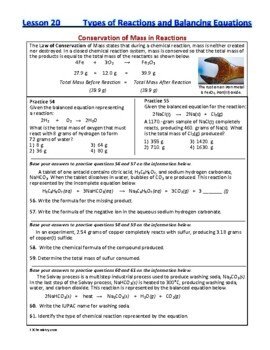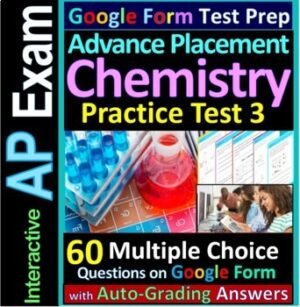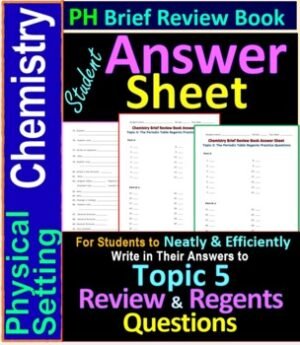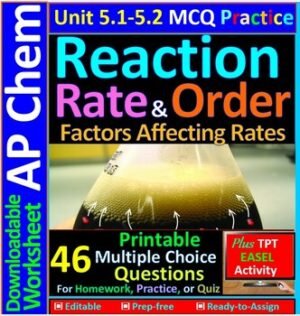Description
~High School Chemistry Essential Lesson – NYS Regents Standards~
This lesson is on:
- Types of Chemical Reactions, Reactants, Products, Coefficient, Balancing Equations.
Newly revised and enhanced PDF for TPT Digital Activity to better support your
in-class, virtual, or hybrid learning. Easy to assign, grade, and assess on Google Class.
The Five Essentials of this resource make chemistry easy to get for students of all skill levels:
1. Guided Reading
- A super easy to follow, learn and understand guided reading and explanation of key materials
- Each concept boxed and separated from the next to keep students focusing on one concept at a time
- Key terms are emboldened, simply defined, and further explained for better understanding
- Many colorful images, pictures, diagrams, and tables to support visual learners and boost understanding and memorization
2. Examples and Solutions
- Clearly noted example problems so students know what problems are being solved
- Step-by-step solutions so students can follow and remember how to solve similar problems
3. Practice Practice Practice
- Highly organized and doable sets of practice multiple-choice and short-answer questions
- Easy to assign, test, and assess students’ skills, knowledge, and understanding of the materials.
- Many examples for each concept or a group of related concepts
4. Multiple and Flexible Uses
- Excellent resource as a textbook supplement and review
- Assign for pre-lesson or post-lesson reading to complement your teaching
- Use as homework, classwork, or test-prep
5. There are More Like This
- 60 more similar essential skill lessons are available in 13 high school chemistry topics
- Bundles and ultimate bundles are available at huge discounts
- Collect them all to give your students consistency in reading and work materials throughout the school year.
My resources follow the New York Regents curriculum. Some questions require the use of NYS Chemistry Reference Tables 2011 Edition. Click to access and download.
Bundle Up to Save:
61 Essential Skills Worksheets + 61 Essential Skills Lessons Ultimate Bundle
Essential Skills Worksheets Super Bundle
Essential Skills Guided Lessons Super Bundle (individual lessons are listed below)
Grab another essential skill lesson for your students:
Topic 1 Bundle: Matter, Energy, and Change
Lesson 1: Types and Classification of Matter.
Lesson 2: Phases of Matter and Temperature.
Lesson 3: Heat and Heat Calculations
Lesson 4: Characteristics of Gases and Gas Law Calculations
Lesson 5: Physical and Chemical Properties and Changes
Topic 2 Bundle: The Periodic Table
Lesson 6: Reading the Periodic Table of Elements
Lesson 7: Types and Properties of Elements. Metals, Nonmetals, Metalloids, Halogens, Noble Gases
Topic 3 Bundle: Atomic Structure
Lesson 9: History of Atomic Models
Lesson 10: Structure of an Atom, Atomic Mass, Isotopes
Lesson 11: Arrangement of Electrons
Lesson 12: Neutral Atoms and Ions
Topic 4 Bundle: Chemical Bonding
Lesson 13: Stability and Energy in Bonding
Lesson 14: Types of Chemical Bonds
Lesson 15: Types and Properties of Substances
Lesson 16: Polarity, Shapes and Intermolecular Forces
Lesson 17: Electron-dot Diagrams
Topic 5 Bundle: Chemical Formulas and Equations
Lesson 18: Types of Chemical Formulas
Lesson 19: Chemical Nomenclature
Lesson 20: Types of Chemical Reactions and Balancing Equations
Topic 6 Bundle: Moles and Stoichiometry
Lesson 21: Mole and Mass Calculations in Formulas
Lesson 22: Percent Composition Calculations
Lesson 23: Mole Calculations in Equations
Lesson 24: Properties of Solutions
Lesson 25: Solubility Factors of Solutions
Lesson 26: Types of Solutions and Solubility Curves
Lesson 27: Molarity and Parts per Million Calculations
Lesson 29: Effect of a Solute on Properties of a Solution
Topic 8 Bundle: Acids, Bases, and Salts
Lesson 30: Acid and Base Theories and Definitions
Lesson 31: Acid and Base Indicators and pH
Lesson 32: Reactions of Acids and Bases
Lesson 33: Acid-Base Titration
Lesson 34: Relating H+ Concentration to pH
Lesson 35: Salts and Electrolytes
Lesson 36: Naming and Writing Formulas of Acids
Topic 9 Bundle: Kinetics and Equilibrium
Lesson 37: Reaction Rate, Catalysts, and Activation Energy
Lesson 38: Energy in Chemical Reactions
Lesson 39: Potential Energy Diagrams
Lesson 41: Physical Equilibrium
Lesson 42: Chemical Equilibrium and Le Chatelier’s Principle
Topic 10 Bundle: Organic Chemistry
Lesson 43: Properties of Organic Compounds
Lesson 44: Hydrocarbon Compounds
Lesson 45: Functional Group Compounds
Topic 11 Bundle: Redox and Electrochemistry
Lesson 49: Half-reactions: Oxidation and Reduction
Lesson 50: Redox: Oxidation-Reduction Reactions
Lesson 51: Components of Electrochemical cells; Anode, Cathode, Salt Bridge
Lesson 52: Voltaic and Electrolytic Cells
Topic 12 Bundle: Nuclear Chemistry
Lesson 54: Nuclear Chemistry Particles
Lesson 55: Nuclear Decay and Reactions
Lesson 56: Balancing and Writing Nuclear Equations
Lesson 58: Uses and Benefits of Radioisotopes
Topic 13 Bundle: Lab Safety and Measurements
Lesson 59: Lab Safety, Procedures, and Equipment










Reviews
There are no reviews yet.